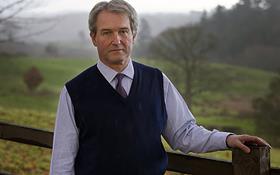
Environment secretary Owen Paterson has continued to back the implementation of genetically modified crops, telling scientists that the EU must move to end the 'unfair scepticism' surrounding the controversial technology.
Speaking today at the Rothamsted research institute, near St Albans, Paterson claimed that next-generation GM crops offer a 'wonderful opportunity' to improve human health. A trial of GM wheat crops is currently being carried out at the institute.
Paterson believes GM technology can assist growers as they deal with unpredictable weather and fight crop diseases.
He explained: 'If used properly GM promises effective ways to protect or increase crop yields. It can also combat the damaging effects of unpredictable weather and disease on crops. It has the potential to reduce fertiliser and chemical use, improve the efficiency of agricultural production and reduce post-harvest losses.'
Paterson's speech has already been criticised, with Soil Association policy director Peter Melchett claiming that Paterson’s 'GM dream' will make it 'harder to feed the world' and that the DEFRA chief is only out to help benefit chemical companies such as Bayer and Syngenta.
He said: 'The British Government constantly claim that GM crops are just one tool in the toolbox for the future of farming. In fact GM is the cuckoo in the nest. It drives out and destroys the systems that international scientists agree we need to feed the world. We need farming that helps poorer African and Asian farmers produce food, not farming that helps Bayer, Syngenta and Monsanto produce profits.”
It is 'misguided' to believe that GM is the only option in feeding a growing population, according to Christine Tacon, the first Groceries Code Adjudicator and former MD of The Co-operative Farms. She believes that engineering and a reduction in inputs within fruit and vegetable production are both more sensible alternatives.
She exclusively told FPJ: “There is a whole branch of engineering we haven’t even started to look at and machines can help to fill the gap; it is misguided to think the only answer to feeding a rising population is GM crops.'
However, Paterson says that DEFRA now owes a duty to the British public to covince them that GM food is safe for consumption.
“I recognise that we - government, industry, the scientific community and others - owe a duty to the British public to reassure them that GM is a safe, proven and beneficial innovation.
'But I agree with EU chief scientist Anne Glover who has said it pretty bluntly - there is no substantiated case of any adverse impact on human health on animal health or on environmental health.'
It would seem that Paterson will have a fight on his hands in convincing the British public, with a survey from YouGov earlier this month finding that only 21 per cent of the population supports GM technology, while 35 per cent opposes it.
In December 2010, the European Commission concluded there is “no scientific evidence associating genetically modified organisms with higher risks for the environment or food and feed safety than conventional plants or organisms”.






No comments yet